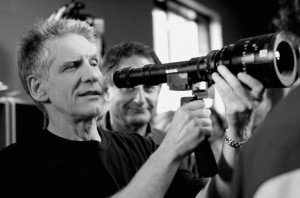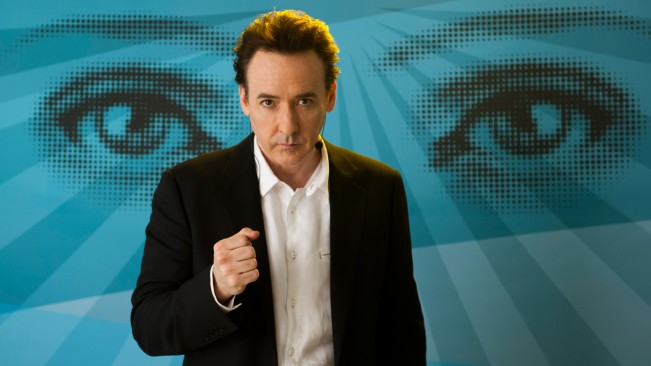By Jake Howell jake.howell@utoronto.ca
Countdown To Cannes: David Cronenberg
The fifth in a series of snapshots outlining the nineteen directors in the 67th Palme d’Or Competition.
Background: Canadian; born in Toronto, Ontario 1943.
 Known for / style: Videodrome (1983), Crash (1996), A History of Violence (2005), Cosmopolis (2012); an evolving canon of films that are often cerebral, experimental, or otherwise disturbing; subversive spins on the mundane; themes of existential angst and domestic crises; body horror.
Known for / style: Videodrome (1983), Crash (1996), A History of Violence (2005), Cosmopolis (2012); an evolving canon of films that are often cerebral, experimental, or otherwise disturbing; subversive spins on the mundane; themes of existential angst and domestic crises; body horror.
Notable accolades: Cronenberg’s informal title as Canada’s most distinguished filmmaker has been more or less built by North American critics. At Cannes, he absorbed a Special Jury Prize for Audacity for Crash, and in 2006, he was given the “Golden Coach” award by the Festival, a lifetime achievement prize. He’s won a plethora of local Genie awards, he’s a two-time winner of the National Society of Film Critics’ (USA) Best Director award (A History of Violence and Naked Lunch), as well as a Best Screenwriting award (Naked Lunch), and he’s been paid countless dues by LAFCA, NYFCC, and the TFCA critic societies. In 2013, the Toronto International Film Festival showcased a major exhibition on his life’s work, “David Cronenberg: Evolution.”
Previous Cannes appearances: DC’s Palme pitches include Crash (1996), Spider (2002), A History of Violence (2005), and Cosmopolis (2012). In 2007, he participated in the auteur pantheon Chacun son Cinéma (Out of Competition). In 1999, he was President of the Jury.
Film he’s bringing to Cannes: Maps to the Stars, with Julianne Moore, Robert Pattinson, John Cusack, Mia Wasikowska, Sarah Gadon and Olivia Williams. The film unfurls as a commentary on both Western civilization and the entertainment industry, centering on an archetypically “famous” family with some unusual complications and bizarre twists. Robert Pattinson will spend more time in a Cronenbergian limousine, while Bruce Wagner’s script will feature his signature criticisms of Hollywood. (“Reality shows are the new American narcotic.”)
Could it win the Palme? We can divine a fair amount from gazing at the film’s trailer. Cronenberg’s more recent cinema has a discursive, nihilistic, distant, perhaps sterile feel, with A Dangerous Method (2011) and Cosmopolis landing divisively amongst critics. That aesthetic seems to be the case again in Maps to the Stars, and while there is more to these films than the lazy dismissal of them being “talky,” Jane Campion’s jury constellation might align differently.
 Why you should care: “I infect my work with madness, then let it settle,” Bruce Wagner told LA Weekly in 2005 when his satirical Hollywood novel, “Dead Stars,” was released. “The story is infected by something, like in David Cronenberg’s films.” Ten years ago, after a decade of working on a script inspired by his time as a Hollywood limo driver (like Pattinson’s character in Maps), Wagner showed his work to Cronenberg. They’ve been trying to make this film ever since, eventually finding an A-list cast to join them. And if you’re a Twilight fan, you already care: this is Cronenberg’s second film with Robert Pattinson, an unlikely acting-directing partnership that nonetheless feels very appropriate. This is also Sarah Gadon’s third feature with Cronenberg, and starring in a film about the entertainment industry seems fitting as the Canadian actress continues to find fame.
Why you should care: “I infect my work with madness, then let it settle,” Bruce Wagner told LA Weekly in 2005 when his satirical Hollywood novel, “Dead Stars,” was released. “The story is infected by something, like in David Cronenberg’s films.” Ten years ago, after a decade of working on a script inspired by his time as a Hollywood limo driver (like Pattinson’s character in Maps), Wagner showed his work to Cronenberg. They’ve been trying to make this film ever since, eventually finding an A-list cast to join them. And if you’re a Twilight fan, you already care: this is Cronenberg’s second film with Robert Pattinson, an unlikely acting-directing partnership that nonetheless feels very appropriate. This is also Sarah Gadon’s third feature with Cronenberg, and starring in a film about the entertainment industry seems fitting as the Canadian actress continues to find fame.
An unauthorized-for-distribution version of the red-band trailer is here.
Follow Jake Howell on Twitter
Previous Entries:

















Jake Howell, you know that is not David Cronenberg pictured there? Even if John Cusack is in Cronenbergs latest film wouldn´t it be nice to have a photo of THE ACTUAL DIRECTOR this article is about?